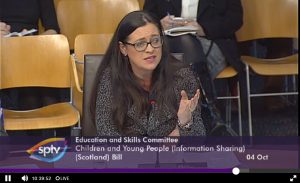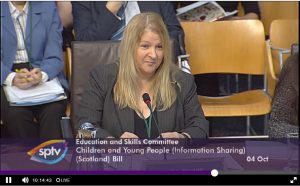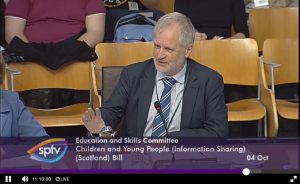Blog
Keeping you up to date on the progress of the Named Person scheme and the NO2NP campaign.
Teachers and data-sharing officials turn up the heat on Named Persons
Posted 8 years agoWorries about teachers’ workload and anxiety around Named Person liabilities were at the forefront of today’s Education and Skills Committee evidence session.
Headteacher and EIS member Lorraine McBride told MSPs that being a headteacher was already a “difficult, difficult job”, and said that adding the Named Person duties “makes everything that bit bigger”. She told the committee that headteachers were worried about being liable if they got it wrong, admitting: “We worry ourselves sick every single day.”
Lisa Finnie of the Scottish Guidance Association, a body which helps teachers involved in the personal support of children and young people, said she felt like they were doing three jobs – teaching, work in the school and the 3am job at home.
She argued that asking them to take on the Named Person role would be an impossible task. She told the committee: “It’s like asking the checkout girl to go and fill the shelves when she’s got a queue. You can’t do it. It’s impossible to ask people to do it”.
Senior officials from the Information Commissioner’s Office (ICO) also gave evidence to the committee today.
Dr Ken Macdonald, ICO’s Head of Regions, told MSPs that the ICO was never totally satisfied with the Named Person Bill. He said the original Bill did not meet the criteria of the Data Protection Act.
When asked if he had informed the Scottish Government that he was not satisfied, he responded by saying the Scottish Government had been copied into emails.
NO2NPers will recall that Dr Macdonald was responsible for the 2013 guidance which gave the green light to Named Person information sharing. He was later forced to withdraw it.
He was also pressed about private emails which emerged after the Named Person Supreme Court ruling in which he expressed his disappointment with the judgment. He did not explain what it was about upholding the fundamental human rights of families that he found so disappointing.
And in another blow for the Scottish Government, Maureen Falconer, ICO’s Scotland Regional Manager, told the committee that the Government’s illustrative code of practice was “not fit for purpose”.
The Education and Skills Committee wrote to Deputy First Minister John Swinney two weeks ago asking for a revised code of practice, but this request was rejected.
Dr Macdonald told MSPs that the code of practice was integral to complying with the Supreme Court ruling and without it the committee would find it difficult to come to a conclusion about whether the revised scheme is adequate.
The Scottish Government’s attempt at fixing the Named Person scheme has received repeated criticism in recent weeks from professionals including lawyers, teachers and social workers, who have been giving evidence to the Education and Skills Committee.
NO2NP spokesman Simon Calvert responded today, saying:
“The Named Person scheme is holed below the water line and rapidly sinking under a tsunami of condemnation from experts and those expected to implement it.
“The Government was humiliated in the UK Supreme Court when judges told them their first proposals were unlawful.
“Now John Swinney’s new Bill, which depends on a code of practice yet to be seen, is floundering badly. The draft code has been attacked on all sides by information watchdogs, teachers, lawyers and health visitors.
“The draft code ‘is not fit for purpose’, according to evidence given to MSPs by Maureen Falconer, the ICO’s Scottish regional manager.
“Yet, Mr Swinney has told MSPs he is refusing to give them sight of a final code before they pass his Bill. This is preposterous arrogance.
“The information watchdogs told MSPs it would be difficult for them to make definitive conclusions about the Bill without seeing the final code.
“Mr Swinney should put up. But perhaps he is too feart in case his proposals are rejected.
“The best alternative is to just rip up the Bill and forget it.”
Yes Mr Swinney, teachers and health visitors are still concerned about Named Person workload
Posted 9 years agoFor several years, teachers and health visitors have raised concerns about the increased workload associated with the Named Person duties.
And those concerns have not gone away.
A look through the notes from John Swinney’s recent ‘three-month period of intense engagement’ reveals yet more riveting findings!
Unite was concerned about “the implications on members’ workload of fulfilling the Named Person role”, something that will be “influenced by any specific requirements and guidance on information sharing”.
And the Education Unions wanted to consider how the Named Person role fits with teachers’ wider workload to ensure that “the Named Person role does not create additional bureaucracy as there is already a lot of paperwork in schools”.
Speaking back in 2015 during a meeting of the Education and Culture Committee, General Secretary of the Association of Headteachers and Deputes in Scotland, Greg Dempster, said: “The biggest issue that I hear mentioned as an absorber of headteacher time is the bureaucracy associated with the named person duties and GIRFEC.”
In the same year the country’s largest teachers’ union, EIS, said that it would have “serious concerns” about any related workload demands during holidays.
An EIS spokeswoman said at the time: “Teachers are becoming increasingly concerned about the demands likely to be made of them which will have implications for workload and potentially for conditions of service.”
If the Scottish Government expects teachers and health visitors to carry out Named Person duties, it really ought to give some answers to allay these concerns… Don’t you think?
Named Person ‘bureaucracy’ is a big issue, says leader of headteachers
Posted 10 years agoGeneral Secretary of the Association of Headteachers and Deputes in Scotland, Greg Dempster, has raised concerns about what the bureaucracy of the Named Person scheme will do to a headteacher’s time.
Speaking during a meeting of the Education and Culture Committee in November, Dempster said: “We need a review of the expectations on school leaders in primary.”
“There is an issue with bureaucracy. The biggest issue that I hear mentioned as an absorber of headteacher time is the bureaucracy associated with the named person duties and GIRFEC. It would be useful to have a look at that bureaucracy.”
In July The Herald reported that teachers were concerned about the extra workload the Named Person scheme would create.
The country’s largest teachers’ union, EIS, said that it would have “serious concerns” about any related workload demands during holidays.
The union, which says it backs the scheme in principle, criticised the lack of clarity over how the scheme would work and said its members were becoming increasingly worried about the extra burden the Named Person role will place on them.
NO2NP spokesman Simon Calvert said at the time: “Teachers have a hard enough time and carry out what can sometimes be a thankless job without adding to their burdens during their well-deserved holidays.”
Teachers concerned over demands of Named Persons workload
Posted 11 years agoTeachers, who are due to become Named Persons for their pupils, have voiced concerns about the increased workload the scheme will bring.
Herald Scotland reported a letter it had seen from the Scottish Government asking schools if their “existing on-call arrangements outside term time for senior staff could ensure the ‘continuity’ of the named person service”.
The country’s largest teachers’ union, EIS, said that it would have “serious concerns” about any related workload demands during holidays.
The union, which says it backs the scheme in principle, criticised the lack of clarity over how the scheme would work and said its members were becoming increasingly worried about the extra burden the Named Person role will place on them.
An EIS spokeswoman said: “While we await the publication of final statutory guidance on the role of the named person which comes into effect in August 2016, there is the problem that in schools across the country, different things are being said about how the named person service will operate. Teachers are becoming increasingly concerned about the demands likely to be made of them which will have implications for workload and potentially for conditions of service.
“The level of support the named person will be expected to provide is not yet clear and may vary greatly from case to case. For this reason, the default position should not be assumed that a school should always be expected to provide the named person irrespective of its capacity and resources.”
NO2NP spokesman, Simon Calvert, said: “Teachers have a hard enough time and carry out what can sometimes be a thankless job without adding to their burdens during their well-deserved holidays.”










